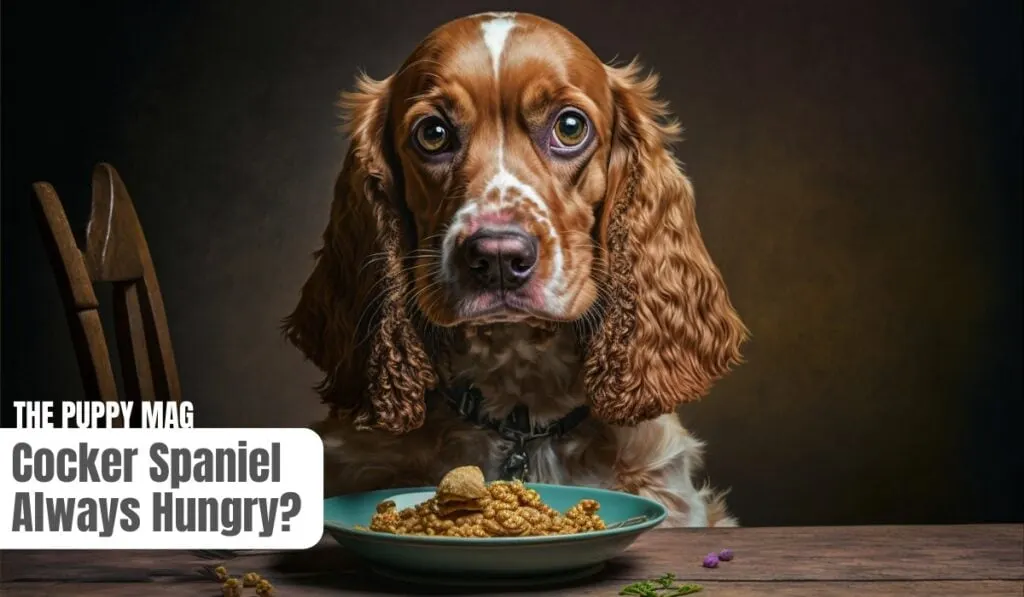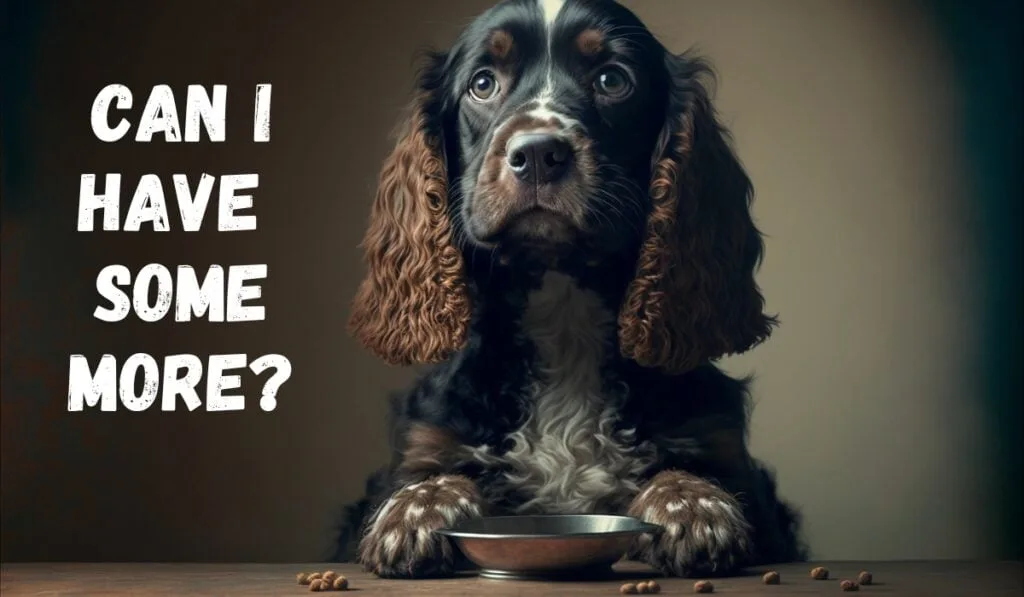Does it seem like your cocker spaniel could eat forever? This is a surprisingly common issue with this breed, so let’s discuss it below.
This article has everything an owner needs to know about spaniels eating excessively, the causes, when to worry, and what to do next.
The quick answer: The two most common causes of excessive hunger in cocker spaniels are inadequate nutrition and underlying health issues. Other reasons include boredom, high metabolism, excessive exercise, and stress.
7 Reasons Why Your Cocker Spaniel Is Always Hungry

Let’s explain in detail the reasons behind excessive hunger in cocker spaniels.
1. Inadequate nutrition
The first and most common reason causing hunger is not receiving enough nutrition in the first place.
This can either be due to incorrect portion sizes or the food itself being low quality and lacking nutrition.
If your spaniel feels like their body needs more calories, protein, and fat, as well as vitamins and minerals, they will seek to eat more food, whether it’s their own, or yours!
2. Underlying health issues
Appetite changes, for better or for worse, is perhaps one of the most common symptoms of a wide range of health issues.
Specific health problems that cause an increase in appetite include:
- Hyperthyroidism
- Diabetes
- Cushing’s Disease
- Intestinal Parasites
- Cancers
Hyperthyroidism and diabetes are particularly common issues with cocker spaniels.
Ultimately, with any health issue, there will be multiple symptoms. If your spaniel displays lethargy, weakness, diarrhea, vomiting, or any other kind of unusual behavior, its important to contact your veterinarian.
3. Boredom (lack of simulation)
Cocker spaniels need their minds put to work!
These dogs get quickly get bored and frustrated if they aren’t receiving focused mental stimulation.
Boredom can lead to excessive eating and an increase in hunger. Hey, we can’t blame them!
Many of us peer in the fridge from time to time for no reason at all other than boredom!
4. Excessive exercise
If your cocker spaniel receives many hours of activity per day, they will have a naturally higher appetite.
While this isn’t always a bad thing, there does come a balance between how much exercise is healthy and how many calories are reasonable for a spaniel to consume.
While cocker spaniels love their exercise, 1-2 hours per day is enough, with 2 hours being at the upper end.
Anything more than 3 hours would be considered excessive and owners need to keep in mind their joint health. Let alone their feisty appetite.
5. High metabolisms
Some cocker spaniels have a naturally high metabolism and crave a high caloric intake.
Medical issues do not cause this, nor is it caused by excessive exercise. It’s all down to genetics.
Of course, this is very hard to actually diagnose and is usually the cause if we can’t think of any other logical explanation.
While there’s nothing we can do to fix your spaniel’s genetics, we can still manage their hunger with the following tips below.
6. Stress and anxiety
Spaniels dealing with stress (both short-term and chronic) can experience a change in appetite.
While stress typically causes a decrease in appetite in dogs, it can sometimes cause an increase.
Eating can be associated with a feeling of comfort and is likened to a pacifying behavior.
Again, this is another similarity between humans and our beloved pet pooches.
7. Time of the year
In some situations, the changing weather and temperature can impact appetite, sometimes quite a bit!
Typically dogs crave to eat more during the winter months. And this is justified to a certain extent as in winter, it requires more energy/calories to maintain body heat.
It’s perfectly normal and okay to give a little extra food to your pooch during the cold months, so long as they aren’t already overweight.
How To Find Out The Cause

Resolving the issue (if there is one) depends on accurately understanding the cause.
There are several things owners must consider to help identify a potential cause. Still, even then, without the help of a vet, nothing is guaranteed.
- Owners need to consider everything from their spaniels routine, exercise levels, past appetite levels, any recent changes to their routine or environment, their age, the time of year, and all other recent events.
By doing this, owners might spot a recent change or notable event that could explain their high appetite.
You might have noticed your spaniel’s routine lacks mental stimulation… Or perhaps their exercise levels are too high… Owners may inspect their food and realize the brand or nutrition contained isn’t particularly high in quality…
These are just some examples of how to investigate the cause.
Once owners find the cause, most often than not, the solution becomes obvious.
If you’re finding it difficult to explain your spaniel’s excessive appetite, then of course, please contact your vet for their professional guidance.
When To See a Vet
As explained earlier, it’s important to seek the help of your vet if your spaniel displays other symptoms like lethargy, weakness, diarrhea, vomiting, or unusual behavior.
Tips For a Stable Appetite
Let’s run through the basic (yet essential) pieces of advice that will help keep your spaniels appetite stable.
- Stick to rigid feeding times on a daily basis
- Ensure the food you provide is high quality and stick to strict portion sizes
- Avoid giving table scraps or too many treats
- Stick to low calorie dog treats given at similar times throughout the day
- Keep exercise levels stable and consistent
- Ensure your spaniel receives daily mental stimulation (training, puzzle games, socialization)
- Avoid leaving your spaniel home alone for too long (main cause of stress)
Despite these tips being somewhat obvious, they will help to keep a healthy and stable appetite.
If you think your spaniels routine might be a little “out of whack” or chaotic, then it’s time to try stabilizing it, and their appetite will likely return to a healthy level.
Thanks for reading!
